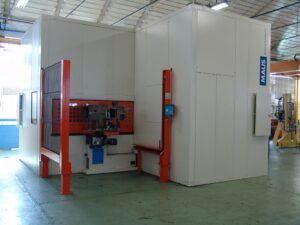
To succeed in satisfying a production characterized by small batches and complex pieces with machining operations complementary to grinding is not easy. Technical skills and proven experience allow providing technological reliable and performing solutions, able to meet the demands of an exacting and competitive market, always.Specialized in automatic grinding and vertical turning solutions, Maus provides sector players with a wide range of products able to satisfy process requests for applications on cast iron and steel components in the most different ambits including, besides the sector connected with foundries, also the automotive industry, the agricultural sector, the construction and energy industry and the rail transport. Technical and applicative competences that result in advanced, efficient and innovative machines and in flexible solutions for the automatic grinding of pieces ranging from 1 to 10,000 kilos, for mechanical machining in foundry for diameters from 200 to 800 millimetres, with vertical lathes and flexible turning lines. «Solutions», specified Sandra Selwan, Strategic marketing & key account of Maus, «that have been conceived, designed and developed to carry out operations in fast and efficient way, assuring the highest possible flexibility. As in the case of a recent application, unique of its kind, which couples inside the same NC machine both grinding, flattening and drilling operations».
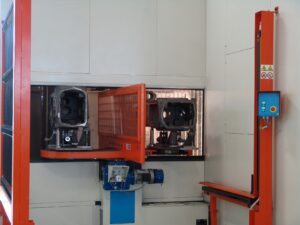
Automating small batches of complex pieces We are talking about a project developed for a jobbing foundry, specialized in gray and spheroidal graphite iron castings for the agricultural sector, whose production is characterized by small batches and complex pieces with machining operations that are complementary to grinding. «The workpiece in question to be machined», added Selwan, «is the counterbalance support of a tractor. A component that, in addition to grinding that was previously carried out manually, needed a flattening, and afterwards drilling, operation to be delivered to the final customer as finished part». Maus, from its headquarters at Campodarsego (Padua), to meet effectively the customer’s specific needs, has exploited the various experiences gained in over 25 years of activity in the field, both in grinding and in machining, developing a grinding centre model Sam 1200 G/Combi, thus integrating grinding tools with flattening and drilling tools on dedicated electrospindles. The machine is so equipped with 6 diamond tools and can machine pieces weighing up to 400 kilos, including the piece clamping equipment, with a maximum swing of 1,200 millimetres. «The advantage of using diamond tools», further underlined Selwan in person, «allows keeping the tool profile constant and then assuring constant grinding quality in time, granting longer tool life and in this way simultaneously reducing the piece cost».
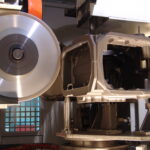
The grinding centre Sam 1200G/Combi is provided with four NC axes with re-circulating ball guides that grant high stiffness to the system. The total 150 kilowatt power installed permits heavy stock removals with a single pass, thus reducing overall grinding times. But also flexibility represents a strong point and a further essential requisite for companies dealing with the management of several different product codes in small-size batches. Peculiarity, this one, assured also by the presence of a big number of available tools. «Not only. The high operating flexibility of the centre is also guaranteed», specified Sandra Selwan, « by the two-position pallet changer that allows loading and unloading in hidden time, by the piece measuring laser and by the piece clamping equipment standing out for simple structure and fast replacement, without forgetting the off-line programming». The possible complete finishing of the piece in a single setup allows the customer to reduce production times and costs drastically (machining and logistics), borne with the current process until now. The cycle time obtained for this piece is 4 minutes against 7.5 minutes in manual, without considering the time of internal and external handling.
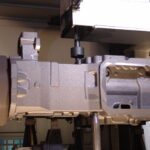
The added value of the finished piece The offer by Maus, thanks to deep experience as well as to the specialization gained by the company in the automatic grinding field, is expressed by an array of productive opportunities that include then flexible grinding centres but also robotic isles, grinding cells for the automotive industry, combined machines (like the one previously described) as well as, obviously, turn-key plants. «It is in fact constantly growing», underlined Selwan, «foundries’ need of adding value to their pieces: this means grinding, but also machining the piece to supply it finished, all in foundry. All that constantly in line with the increasingly rooted end-users’ requirements of producing pieces at extremely competitive unit costs. Pursuing this direction, all of our technological proposals set the target of satisfying requisites of high flexibility, operational versatility and, at the same time, big output, flexibility and constant finishing quality attainable for the most different sizes and weights of pieces to be ground, and for the various machining typologies».
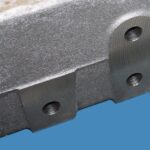
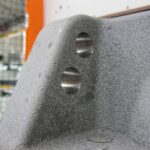
Concerning this, for instance, some foundry components require a multiplicity of operations, which range from the cutting of risers up to external and internal grinding. A variety of functions calling for a multiplicity of peculiarities and technical specific features of the machine, which go from great stiffness to high power, up to the versatility of positions taken by the tool. Requisites, these ones, which are at the base of the effective integration of functions of the Sam series with those of the Robogrind line, in the range called Sam Hybrid. This allows performing more machining operations simultaneously, thus reducing cycle times and, consequently, also the cost of the automatic grinding process. Best operational integration

More in detail, the machines belonging to the Sam series are very suitable for the production of small-medium size batches for pieces with unit weight ranging from 1 up to 800 kilos. The relevant flexibility of the line permits the complete grinding of the piece on the machine, the easy and fast retooling in hidden time, the easy programming carried out off-line. The latter prerogative allows prearranging the machine for machining a new workpiece, without interrupting the running production for this reason. Such machines stand out for the high stiffness and for the stock removal capacity with spindle power from 3 to 150 kilowatt. They can also remove the gates and cut the risers in fully automated way, for pieces weighing up to 800 kilos, thus significantly reducing the operation cost. With the Robogrind line, this time the Padua company has transferred its whole experience gained in the automatic grinding field to handling robots in double operational configuration: robot that handles the piece or the tool. «Know-how», added Sandra Selwan in conclusion, «that has allowed extending the grinding offer to automated robotic processes for weights of single pieces, as already stated, up to 10,000 kilos». The robotic solution proves to be particularly suitable for the grinding of pieces featuring big sizes and heavy weight, where it is preferable to handle and to orient the tool instead of the piece. This is allowed by the availability of robots with broad working ranges and loading capacity for equipment and tools up to 1,500 kilos.

[BOX title=”CHINA TOO CHOOSES THE ITALIAN AUTOMATIC GRINDING TECHNOLGY” color=”#48bedf”] Chinese State giant operating in the automotive sector, Faw has chosen the most advanced Maus technology for the upgrading of its production plants. Established in 1956, over the years China Faw (First automotive works) group corporation, nationalized Group with headquarters in Changchun in the Northern province of Jilin, has extended its activity to more and more demanding applications in the sector of the commercial vehicle production. It currently ranks as first Chinese producer of trucks and buses, with a productive capacity exceeding one million vehicles per year.
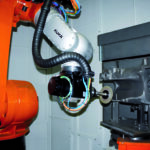
The growth of the technical level of the production has been accompanied, in time, by several collaborations undertaken with foreign partners. Among them, also that signed with Maus, first contract of such relevance for the Chinese market, for the supply of a plant composed by two lines of automatic grinding that includes on the whole 10 Sam 1200L model machines, equipped with robots for the automatic loading and unloading of pieces. The in-depth analysis of the real needs of Faw carried out by Maus, the vastness of the applications and of the solutions implemented worldwide played an essential role in the decisional process of the Asian giant, which chose the Italian technology for the ambitious project of implementing the biggest automated plant for the automatic grinding of the engine blocks for trucks. The supplied plant will be used for the automatic grinding of two different typologies of engine blocks for trucks, with four and six cylinders, with high production rates ranging from 70 to 120 pieces/hour, manufactured with extremely competitive unit costs, optimizing the productive process in terms of high flexibility, great productivity and utmost quality, of course. [/box] [BOX title=”AUTONOMY AND 24/7 PRODUCTIVE CONTINUITY IN VERTICAL TURNING ” color=”#48bedf”] Among the most recent and innovative solutions that Maus has introduced on the market, there are also Mtv5 vertical turning centres, a range conceived for the machining in stand alone modality and with flexible production cells, for the complete machining of components of different complexity, in small and medium volume batches. The new series represents a reference and revolution point of the concept in the manufacturing panorama and is characterized by some distinguishing aspects, such as the rapid change system that confers the highest levels of operational flexibility (for the production of medium-small batches). It is worth highlighting also the wide availability of tools in the magazine and the ATC automatic tool change device performing very short times (3 seconds chip to chip). In the same set-up, it is possible to carry out both turning operations and complementary machining such as drilling, tapping, milling and broaching, just to mention some of them. Some other strong points concern then the full productive autonomy (24 hours a day, seven days a week) and the independence from the operator’s intervention in the productive process, besides the in-process measuring system.
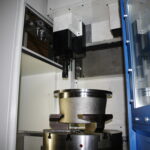
The latter controls the piece and provides for self-calibration and self-compensation functions, in order to grant the repeatability of the machined piece quality. It is worth pointing out also the highly stiff structure that allows the utmost exploitation of all available technological potentialities in terms of enhanced machining parameters, guaranteed by the new generations of tools, extending their service life and conferring then bigger productivity to the system in its entirety. Peculiarities that result in a turning piece height of 400 millimetres, swing of 800 millimetres, spindle torque of 540 nanometres for spindle power of 42 kilowatt. [/box]



